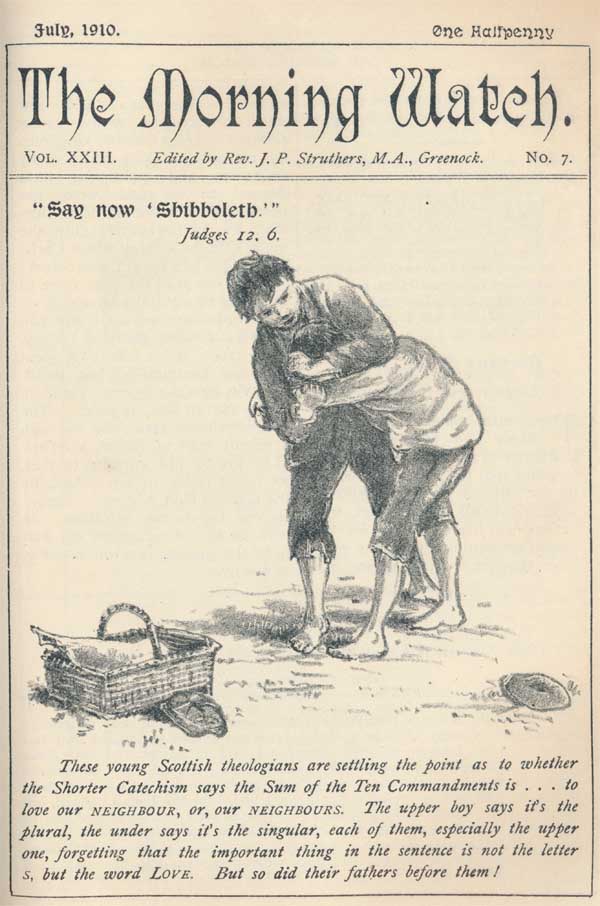This Day in Presbyterian History:
Excluding Some from Partaking of the Lord’s Supper
It was back on November 20th that this historical devotional began to look at what the Larger Catechism states about partaking of the Lord’s Supper. We continue with that theme on this day, November 25, finding no specific Presbyterian topic for our consideration. What is involved in excluding some people from the Lord’s Supper.
Larger Catechism question 173 asks “May any who profess the faith, and desire to come to the Lord’s Supper, be kept from it? And the answer, “Such as are found to be ignorant or scandalous, notwithstanding their profession of faith, and desire to come to the Lord’s Supper, may and ought to be kept from that sacrament, by the power which Christ has left in the church, until they receive instruction, and manifest their reformation.”
It is clear that this catechism answer speaks of some “who are found to be ignorant or scandalous” being excluded from the participation in the Lord’s Supper. On their part, they have a profession of faith and an equal desire to partake of the elements of bread and wine in the Lord’s Supper. And so many might think that the issue is settled. They believe and they have the desire to participate. Isn’t that enough? Our Confessional fathers answer that it is not enough of a reason to participate in this Sacrament.
First, there may be by these ready participants an “ignorance” about their profession of faith. This ignorance may be the result of simply an absence of what biblical Christianity is, or on the other end, they might believe and accept some theological errors regarding biblical Christianity. Both of these constitute a reason to exclude them from the Sacrament when it is offered by the church.
Then there is another exclusion, and it is with respect to a “scandalous” manner of life. The profession might be present, but the possession of faith is doubtful due to a carnal or fleshly lifestyle. The individual is openly carrying on a conduct which violates the Ten Commandments, for example. Such an individual shows that he or she does not understand the work of sanctification in the Christian life.
Now, in both of these cases of ignorance and scandalous living, the Catechetical fathers do not specifically state what they mean. They wisely leave it up to the spiritual courts of session, presbytery, and general assembly to determine this. Sometimes, a local church will designate conduct which it believes is contrary to Christian doctrine and living.The “power which Christ has left in his church”refers to biblical church discipline which must be carried on by each church for its overall purity. And with most of our Presbyterian and Reformed churches, that is the purpose of the Book of Discipline in our Book of Church Order. There are found specific guidelines with respect to the use of “that power which Christ has left in his church.”
This catechism holds out the remedy to any who might be precluded, namely, “until they receive instruction, and manifest their reformation.” There is a place, and it usually is found in the membership class held to any who wish to join the church, for “instruction” with respect to both faith and life as seen in the Bible. When reformation is manifested after instruction is given with respect to their manner of lives, (and it may have to happen for a definition or indefinite period of time,) then the door will be opened to participate in the Lord’s Supper.
Words to live by: In the early part of our country’s history, in Presbyterian circles, this was the task of the pastor, and Session of Elders, if there were any, to examine the participants as to their faith and life. Finding an understanding of the things which were of God, and hearing about their conduct, they then gave each potential participant a metal token, which was then turned in on the day of Communion. That practice has gone away and it is then dependent upon the discernment of the Session of Elders that they have a spiritual understanding of the members under their shepherding care in determining their qualifications to partake of the break and wine. Pray for your elders—teaching and ruling elders—in this important ministry.
Through the Scriptures: 1 Corinthians 13 – 16
Through the Standards: Elements of the Lord’s Supper remain unchanged
WCF 29:5, 6
“The outward elements in this sacrament, duly set apart to the uses ordained by Christ, have such relation to Him crucified, as that, truly, yet sacramentally only, they are sometimes called by the name of the things they represent, to wit, the body and blood of Christ; albeit, in substance and nature, they still remain truly and only bread and wine, as they were before. That doctrine which maintains a change of the substance of bread and wine, into the substance of Christ’s body and blood (commonly called transubstantiation) by consecration of a priest, or by any other way, is repugnant, not to Scripture alone, but even to common sense, and reason; overthrows the nature of the sacrament, and has been, and is, the cause of manifold superstitions; yes, of gross idolatries.”

